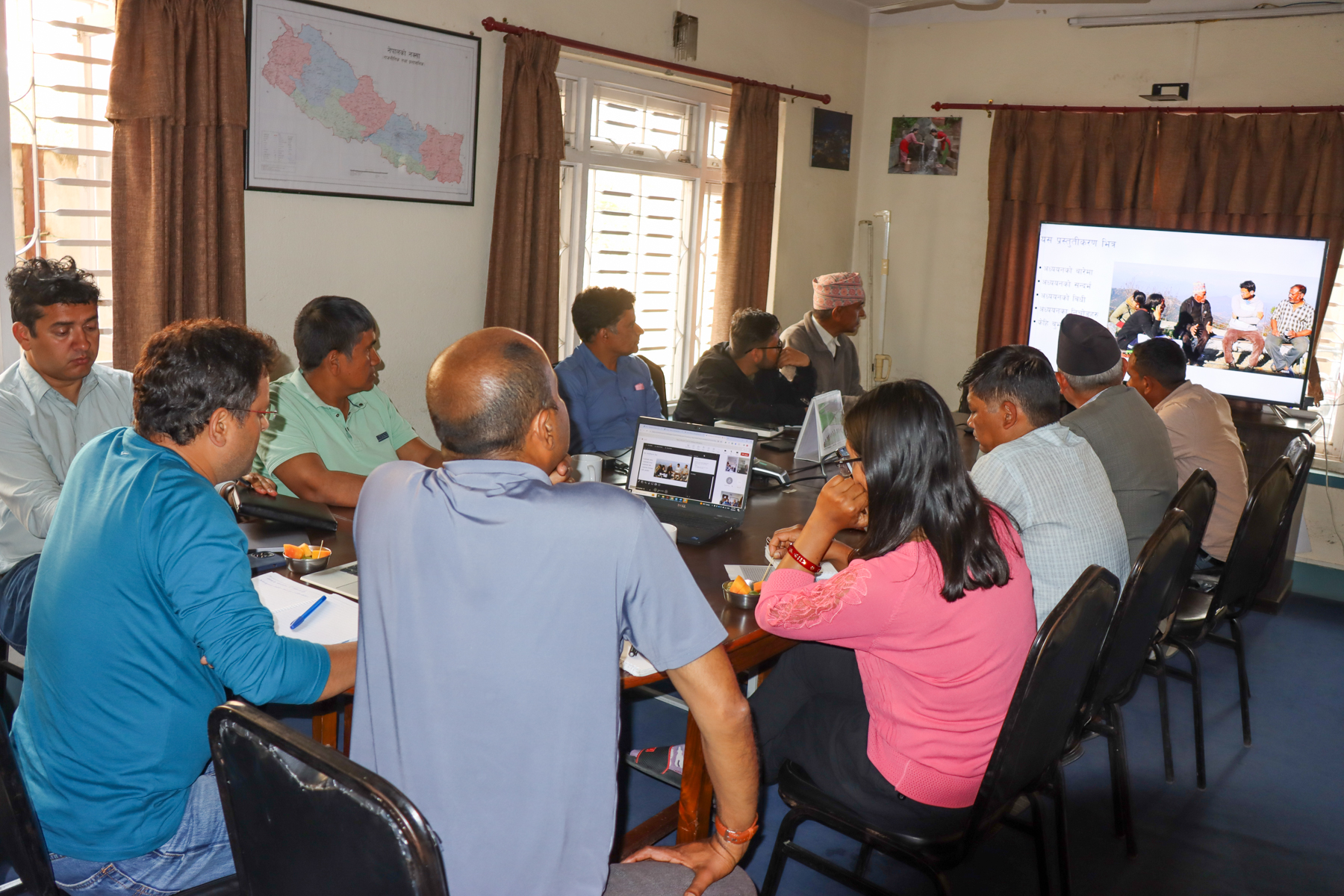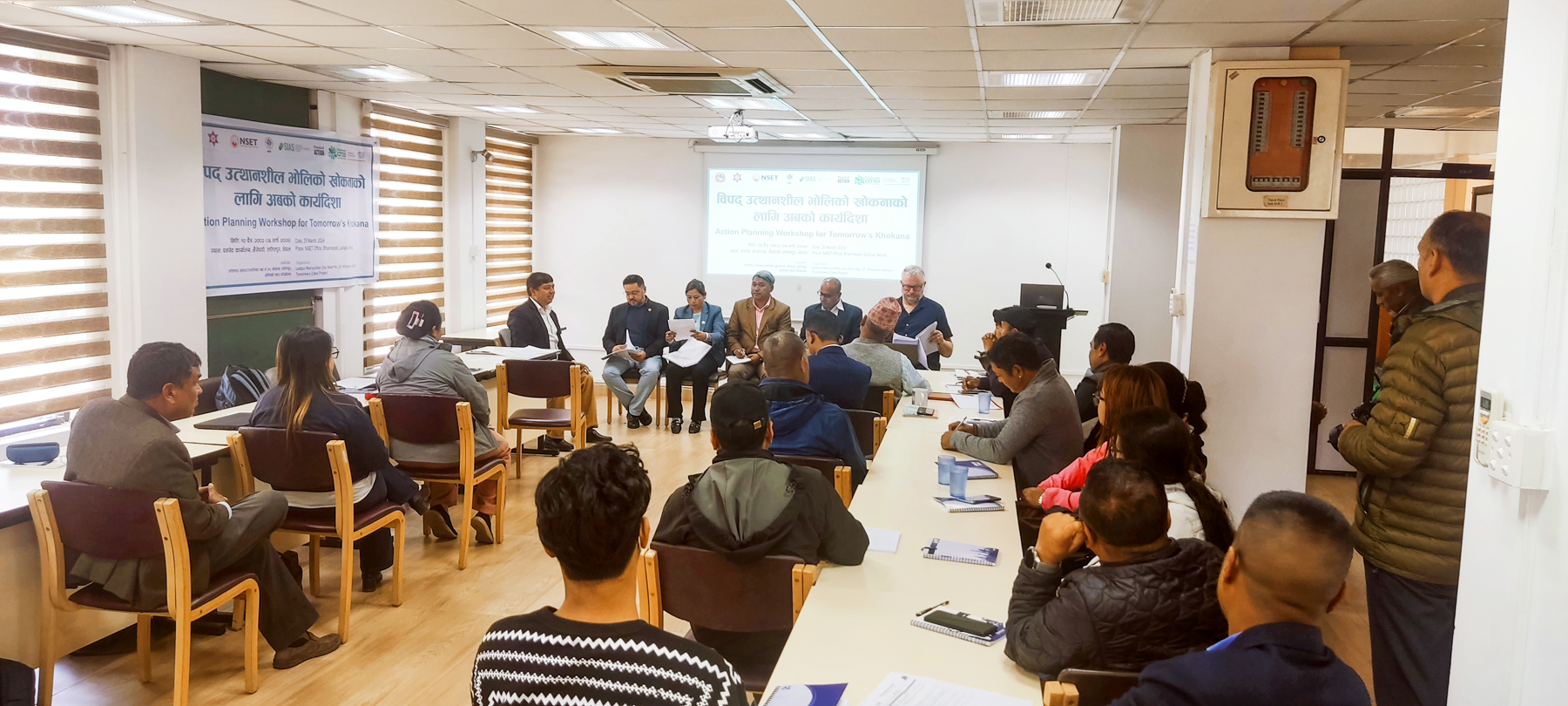Southasia Institute of Advanced Studies (SIAS), National Society for Earthquake Technology (NSET), Institute of Engineering (IoE), Pulchowk, Nepal Development Research Institute (NDRI), and Practical Action (PA) in collaboration with the University of Edinburgh (UoE), UK Research and Innovation (UKRI), and Global Challenge Research Fund (GCRF), collectively organized a Workshop on ‘Risk Agreement for Khokana’ on the 17th and 18th of February, 2023 at Hotel Mystic Mountain, Nagarkot as a part of Tomorrow’s Cities Decision Support Environment (TCDSE). The workshop had broadly two agendas: 1. Impact Priority Survey and Risk Negotiation, and 2. Co-benefit and Consequences Analysis. The workshop was one of the important components associated with Work Package (WP4) of the TCDSE to bring together the different stakeholders of Khokana to agree amongst the four envisioned future scenarios – one community-envisioned scenario and the other three scenarios developed by Kathmandu Valley Development Authority (KVDA). The workshop was chaired by the Ward chair of Khokana, Lalitpur Metropolitan City (LMC) – 21.
Among the total 61 participants present at the workshop, a total of 32 participants ( 9 women) were from Khokana, including the 19 participants of Khokana visioning workshop (organized on December 2021). These included the members of the Ward Disaster Management Committee (WDMC), ward officials, local stakeholders, farmers, women, migrants and marginalized community members. The deputy mayor of LMC also attended the workshop. The workshop was facilitated by researchers from the UK, SIAS, NSET, NDRI, PA, and IoE.
The workshop commenced with welcome remarks from the Ward Chair, Mr. Rabindra Maharjan and Prof. Mark Pelling, co-director of the Tomorrow’s Cities project from University College London (UCL). Prof. Pelling expressed gratitude to all of the community people and requested for their active participation. Before delving directly into the agendas and the group exercise, participants were provided a brief introduction of the TCDSE that was jointly presented by Dr. Dilli Prasad Poudel (SIAS), Dr. Ramesh Guragain (NSET) and Dr. Roberto Gentile (UCL). After the introduction, Dr. Yahya Gamalaldin (UCL) presented the concepts of the Impact Priority survey and briefly described the group exercise to be conducted through a series of “serious” games. For the group exercise on ‘Negotiation and risk agreement’, participants were divided into the same four groups as in the Khokana visioning workshop, i.e., Ward group, WDMC group, Sano Khokana group and the Women, Marginalized and Migrant (WMM) group. Each group was facilitated by 2 facilitators (1 international) for the ‘Impact Priority Survey’ to find the community’s priorities of urban assets in case of hazard events. Additionally, each group was assigned one note taker to document the discussions between participants and facilitators. Each of the disaggregated groups prioritized their urban assets, discussed and negotiated with other groups and eventually came to the agreements on a common vision. This group discussion provided important insights to the participants that priorities are always subjective to individuals’ socio-economic positionalities and priorities.
The second day of the workshop focused on ‘Co-benefit and Consequences Analysis’ where Dr. Tanvi Despande (King’s College London – KCL) gave a brief presentation to familiarize the participants with the topic, and also briefed community members about the exercise. The participants were asked to brainstorm urban Disaster Risk Reduction (DRR) policies and their consequences (positive and negative), mainly on carbon emission and land value. The exercise was conducted separately among the policy makers (the ward group and the WDMC group) and the community people (the Sano Khokana group and the WMM group). Each group was provided a set of seven questions prompting them to think of measures or policies to reduce disaster impacts and their positive and negative relations with carbon footprint and land price.
On the 18th, before the ward Chair’s closing remarks, Prof. Pelling thanked all the participants as well researchers for their energy and active engagement in the two day’s intensive exercises. He highlighted that this is not the end of the process and that there will be more effort to take community messages to a higher level. Subsequently, Mr. Maharjan emphasized the importance of understanding the risks associated with infrastructural development. He also stressed that the valuable visioning scenario that they have developed for a risk-informed and inclusive planning process should go forward to achieve the community’s envisioned/ future city. Finally, he expressed his gratitude to SIAS and NSET researchers for their excellent facilitation and support in making the workshop successful and to Prof. Sangeeta Singh for her important role in engaging Khokana in the Tomorrow’s Cities project.




